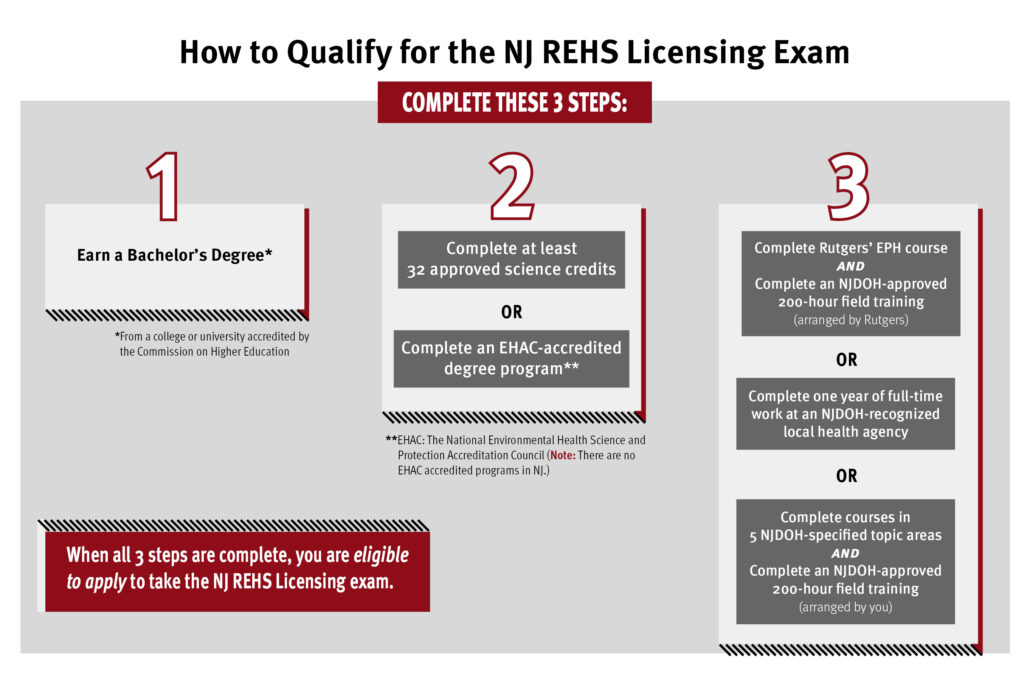Main Content
Your guide to the ins and outs of the REHS exam process, from qualifying and applying for the exam to getting your results.
To earn the NJ REHS license and become an REHS, you must:
- Qualify to take the REHS licensing exam.
- Apply for the exam.
- Take the exam and pass with a score of at least 70%.
Detailed information about each of these steps in the licensing process is available below.
Qualifying for the REHS Exam
Successfully completing the EPH program is one proven pathway to become eligible to sit for the New Jersey State Registered Environmental Health Specialist (REHS) Licensing Exam.
This chart explains how to qualify for the NJ REHS Licensing Exam.

You can also download the EPH Field Training Manual for an example of an NJDHSS-approved REHS field training curriculum.
Wondering what counts as a science credit?
When qualifying for the REHS exam, the required 32 science credits are defined as follows:
- Courses such as biology, chemistry, physics, and environmental science (see a partial list of accepted courses)
- Up to 6 credits may be from college-level mathematics courses (e.g. calculus, statistics)
- At least one of the courses must be a lab course in biology, physics, chemistry, or the environmental sciences.
- If you earned less than a C (2.0) for a course, it won’t count towards the 32-credit requirement.
Please note the following points about qualifying science credits:
- “Approved” or “eligible” science credits are from courses deemed eligible by the New Jersey Public Health Licensing and Examination Board. This is the body of public health professionals who review and approve/deny the applications to sit for the NJ State REHS Licensing Exam.
- Introductory, intermediate, and advanced courses in biology, chemistry, physics, geology, and environmental science are generally acceptable (see a partial list of accepted courses).
- Some health sciences courses, including epidemiology, toxicology, communicable/infectious disease, occupational/environmental health, and some nutrition classes are considered eligible courses. Often, one introductory course on public health will be accepted.
- Remedial science courses (high school level) are generally not acceptable.
- Social sciences (psychology, sociology, anthropology, economics, political science) are generally not acceptable.
- Interdisciplinary natural science courses that include a good deal of history, policy, economics, and other humanities or social sciences may not be deemed acceptable.
Applying for the REHS Exam
To be admitted to take the REHS exam, you have to submit an application package* to the NJDOH that includes:
- Your completed application form (Request an Exam Application)
- Original documentation of your training, education, and experience (no photocopies)
- An official sealed copy of your undergraduate transcript (student copies are NOT acceptable)
- Official course catalog descriptions of the courses that qualify you to take the exam
- Non-refundable application fee of $50 (check or money order, payable to “Treasurer, State of New Jersey”)
*Note: Our office assists EPH graduates with the REHS exam application process for the December exam.
While Rutgers OCPE will give you plenty of guidance on how to fill out your application packet correctly, ultimately you are responsible for making sure your application is correct and complete before it is submitted. NJDOH will reject incomplete applications from being reviewed, and the application fee is non-refundable!
When you submit your application to NJDOH, it is directed to the Office of Local Public Health (OLPH), specifically to the Licensure and Compliance Team. The members of that team will do an initial review of your application. If they find anything missing or incomplete, they may alert you and/or the EPH Program Coordinator and ask you to amend your application. If the issue is not resolved, OLPH will not submit your application for the final review, which is conducted by a diverse body of NJ public health and environmental health professionals, called the Public Health Licensing and Examination Board. This board is responsible for reviewing your application, and will make the final decision as to whether you are indeed eligible or not to sit for the NJ State REHS Licensing Exam.
The exam is offered 2 times a year (June and December) through the NJDOH. Upcoming dates are available at http://www.nj.gov/health/lh/professionals/licensing/. The application deadline for each exam is typically 8 weeks before the exam date.
If your application to take the REHS licensing exam is approved, you’ll receive an acceptance notice via email from OLPH 2-3 weeks before the exam date. Candidates who are found ineligible to take the exam will also receive notice of their rejection via email.
Your acceptance notice will include the time and location of the exam. For the past few years, the exam has been held at the NJDOH office in Trenton, NJ. You will be required to bring your exam fee of $100 in the form of a check or money order, made out to ‘Treasurer, State of New Jersey’ with you to the exam. Your acceptance notice will also include pertinent information about coronavirus protocols.
Taking and Passing the REHS Exam
The NJ REHS Licensing Exam is comprised of 100 multiple-choice questions that assess your knowledge of diverse topics, including:
- Public health administration
- Communicable disease
- Food protection and safety
- Water and wastewater
- Vectors, pests, and weeds
- Epidemiology
- Potable water
- Air quality and noise pollution
- Swimming pools and recreational facilities
- New Jersey statutes and rules
- Hazardous materials
To earn an REHS license, you must score at least 70% on the licensing exam. Most people (75-80%) pass the exam on the first try, but the passing rate varies depending on the individuals, their backgrounds, and the amount of time and effort they put into preparing for the exam.
REHS Exam Results and Licensing
Two to four weeks after taking the NJ Registered Environmental Health licensing exam, you will receive official notification of your exam results via email.
If you passed the exam, you will be directed to make an NJLMN account in order to get your official license. Do not delay in making this account!
REHS Licensing Exam Retesting Policy
If you don’t pass the REHS Licensing Exam on your first attempt, you may take the exam again without reapplying by informing the Public Health Licensing and Examination Board (by mail or email) that you wish to take the exam again no later than the application deadline for the exam you wish to take. Upcoming dates are listed at http://www.nj.gov/health/lh/professionals/licensing/.
You will be notified of your acceptance a few weeks before the exam date, and you will have to submit another $100 examination fee to sit for the exam.
If you don’t pass the exam after a second attempt, you will not be allowed to take the exam again until you have completed additional training, which may take the form of on-the-job training at a health department where you are supervised by a Health Officer or REHS, or additional continuing education coursework.
Once you successfully complete the required additional training, you may reapply to take the exam. You’ll have to complete the application process again and submit proof of your additional training. If your reapplication is approved, you will be eligible to sit for the next available licensing exam.
*EPH graduates have an open invitation to return to our class, free of charge, to review the specific topics they need. We reserve the right to charge for materials and food.
